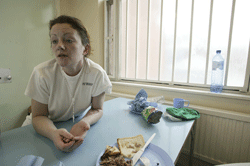
As councils launch campaigns during National Adoption Week (7-13 November) to increase the numbers of children matched with new guardians, a service for the birth mothers left behind continues to operate.
Birth mothers who have had their children compulsorily removed into the care system tend to be a marginalised group in society already and for women in prison awaiting trial this is even more so.
Adoption charity the Post-Adoption Centre provides one of the few services for such mothers at Holloway women’s prison in North London.
The service, which has been running for around five years, aims to give specialised support to the women who have lost their children to adoption or long term fostering.
Guilt
Rita Cleary, a birth parent support worker at the charity who carries out the outreach work in the prison, says that many of the women she works with have had difficult childhoods themselves and that an inability to get away from violent partners or drug abuse are some of the main reasons for having their children taken away.
One of the main parts of her role is to help the women to come to terms with the guilt that they feel towards their children. “Often it’s about helping them to be less harsh on themselves and discussing all the background issues,” she says.
She provides the women with somebody who accepts them for who they are and who they can talk to about how they feel. Cleary, a counsellor by training and who has been in the post for around two years, visits the prison once every two weeks and carries out one to one hour long sessions with the women. She only ever works with two women at one time and prisoners are refered to her by other professionals.
Her service is in demand. When asked if any women only visit her once, rejecting her help, she says that this does not happen. “They always want to come back,” she explains.
One of the main sources of information for the women is other prisoners and Cleary says that this can lead to them gaining false impressions of the way the system works which she then has to try and correct.
“One woman whose children were in the process of being adopted had been told by other inmates that the court wouldn’t listen to her because she was in prison. I was able to explain that to her that this was not true at all, that the fact that she was in prison on remand didn’t mean she didn’t have any rights.”
Letterbox
Another key part of her work involves acting as a link between the women and the social services departments involved in placing their children. She says that sometimes the women themselves are not a priority for the social workers and that she can help them to find out what is happening to their children.
Renegotiating letterbox contact whereby birth parents and their adopted children regularly exchange letters and photographs is also a key issue for Cleary’s clients. She explains how when women go to prison these arrangements can often break down, leaving birth mothers distressed.
“Some imagine that their children are being abused or even that they are dead. I can liaise with adoption support workers and hopefully enable the contact to be resumed,” she says.
Cleary explains how due to Holloway only taking women on remand it’s very difficult to get into concentrated therapeutic work because at any time they women could be moved to a different prison. She says that sometimes she can have a visit arranged only to turn up and discover that her client has left. The charity is currently looking at the possibility of follow-up telephone or video-link sessions for women who are transferred to other prisons in an attempt to give them some closure.
“In this way I could ensure that if I am in the middle of negotiations with social services I can still make contact with the client and also make the ending of our session less brutal – it can be very hard for both of us it there is no chance to say goodbye properly,” she concludes.
Holloway is soon to begin a pilot resettlement project in which women from prisons all of over the country who intend to reside in London after their sentences will be transferred there prior to their release. Cleary is excited by the prospect and sees it as an opportunity to work with the women in a more structured way as, unlike her current clients, the prisoners will know when they are going to be released and therefore a proper ending to their sessions can be planned.


 Bournemouth, Christchurch and Poole
Bournemouth, Christchurch and Poole  Hampshire County Council
Hampshire County Council  Lincolnshire County Council
Lincolnshire County Council  Norfolk County Council
Norfolk County Council  Northamptonshire Children’s Trust
Northamptonshire Children’s Trust  South Gloucestershire Council
South Gloucestershire Council  Wiltshire Council
Wiltshire Council  Wokingham Borough Council
Wokingham Borough Council  Children and young people with SEND are ‘valued and prioritised’ in Wiltshire, find inspectors
Children and young people with SEND are ‘valued and prioritised’ in Wiltshire, find inspectors  How specialist refugee teams benefit young people and social workers
How specialist refugee teams benefit young people and social workers  Podcast: returning to social work after becoming a first-time parent
Podcast: returning to social work after becoming a first-time parent  Podcast: would you work for an inadequate-rated service?
Podcast: would you work for an inadequate-rated service?  Family help: one local authority’s experience of the model
Family help: one local authority’s experience of the model  Workforce Insights – showcasing a selection of the sector’s top recruiters
Workforce Insights – showcasing a selection of the sector’s top recruiters 

 Facebook
Facebook X
X LinkedIn
LinkedIn Instagram
Instagram
Comments are closed.